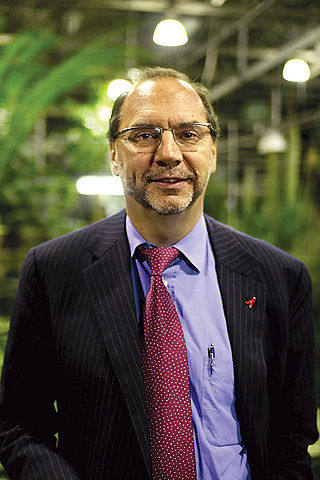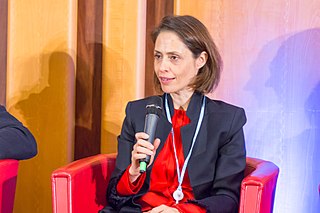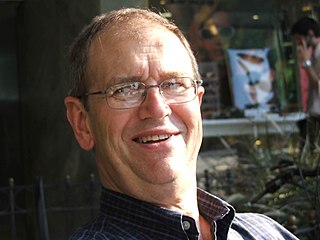Bioethics is both a field of study and professional practice, interested in ethical issues related to health, including those emerging from advances in biology, medicine, and technologies. It proposes the discussion about moral discernment in society and it is often related to medical policy and practice, but also to broader questions as environment, well-being and public health. Bioethics is concerned with the ethical questions that arise in the relationships among life sciences, biotechnology, medicine, politics, law, theology and philosophy. It includes the study of values relating to primary care, other branches of medicine, ethical education in science, animal, and environmental ethics, and public health.

Dafydd "David" Rhys Williams is a Canadian physician, public speaker, author and retired CSA astronaut. Williams was a mission specialist on two Space Shuttle missions. His first spaceflight, STS-90 in 1998, was a 16-day mission aboard Space Shuttle Columbia dedicated to neuroscience research. His second flight, STS-118 in August 2007, was flown by Space Shuttle Endeavour to the International Space Station. During that mission he performed three spacewalks, becoming the third Canadian to perform a spacewalk and setting a Canadian record for total number of spacewalks. These spacewalks combined for a total duration of 17 hours and 47 minutes.

James Jude Orbinski is a Canadian physician, humanitarian activist, author, and scholar in global health. Dr. Orbinski began his role as principal of Massey College at the University of Toronto in the 2024-2025 academic year, where he is also Full Professor in the Department of Family and Community Medicine in the Temerty Faculty of Medicine, and is cross-appointed to the Munk School of Global Affairs and Public Policy, as well as the Dalla Lana School of Public Health,. Previously a professor in the Faculty of Health Science at York University, Dr. Orbinski founded the Dahdaleh Institute of Global Health Research.

Frederick Hans Lowy, is a Canadian medical educator and former President and Vice-Chancellor of Concordia University.

Sir Peter Karel, Baron Piot is a Belgian-British microbiologist known for his research into Ebola and AIDS.

The Temerty Faculty of Medicine is the medical school of the University of Toronto. Founded in 1843, the faculty is based in Downtown Toronto and is one of Canada's oldest institutions of medical studies, being known for the discovery of insulin, stem cells and the site of the first single and double lung transplants in the world.
Joseph Louis Rotman was a Canadian businessman and philanthropist. Rotman was the founder, benefactor and member of organizations such as the Clairvest Group Inc., the Rotman Research Institute, the Rotman School of Management, and the Rotman Institute of Philosophy. Throughout his life, he received three honorary degrees, as well as an induction into the Canadian Business Hall of Fame. He is well-regarded for donating his time and financial assistance to numerous philanthropic causes including the arts, education and healthcare.

Bartha Maria Knoppers, OC OQ is a Canadian law Professor and an expert on the ethical aspects of genetics, genomics and biotechnology.

Victor Joseph Dzau is a Chinese-American doctor and academic. He serves as the President of the United States National Academy of Medicine of the United States National Academy of Sciences and Vice Chair of its National Research Council. He is Chancellor Emeritus and James B. Duke Professor of Medicine at Duke University and former president and chief executive officer of Duke University Medical Center.

The National Core for Neuroethics at the University of British Columbia was established in August 2007, with support from the Canadian Institutes of Health Research, the Institute of Mental Health and Addiction, the Canada Foundation for Innovation, the British Columbia Knowledge Development Fund, the Canada Research Chairs program, the UBC Brain Research Centre and the UBC Institute of Mental Health. Co-founded by Judy Illes and Peter Reiner, the Core studies neuroethics, with particular focus on ethics in neurodegenerative disease and regenerative medicine, international and cross-cultural challenges in brain research, neuroimaging and ethics, the neuroethics of enhancement, and personalized medicine.
Alan Bernstein is Professor Emeritus at the University of Toronto and President Emeritus of the Canadian Institute for Advanced Research (CIFAR), where he served as President and CEO from 2012 to 2022. A Distinguished Fellow at the Munk School of Global Affairs and Public Policy, he is also a Fellow and Member of the Standing Committee for Science Planning at the International Science Council (2022-2025). Canadian Bernstein is recognized as a leader in health research, science policy, mentorship and organizational leadership.
Dr. Abdallah Daar is an emeritus Professor of Clinical Public Health, Global Health, and Surgery at the University of Toronto. He has also been a Senior Scientist at the Research Institutes of University Health Network/Toronto General Hospital Research Institute, and the Hospital for SickKids. At the University of Toronto Joint Centre for Bioethics, from 2001 to 2007, he was the co-director of the Canadian Program on Genomics and Global Health, and the Director of the University of Toronto Program in Applied Ethics and Biotechnology. At the Sandra Rotman Centre, he was Director of Ethics and Commercialization.
Calvin Ralph Stiller is a Canadian physician, scientist, and entrepreneur. He retired as a member of the Schulich School of Medicine & Dentistry at Western University in London, Ontario.
Zulfiqar A. Bhutta is a physician. He holds titles across various organizations in diverse geographies. Professor Bhutta is the Founding Director of the Center of Excellence in Women and Child Health & Institute for Global Child Health & Development, at the Aga Khan University South-Central Asia, East Africa & United Kingdom.

Stanley Paul Kutcher is a Canadian Senator and Professor Emeritus of Psychiatry at Dalhousie University. He was appointed to the Senate of Canada on 12 December 2018.
John Norman Lavis is a Canadian physician based in Toronto, Ontario. He is a tenured professor in the Department of Health Evidence and Impact at McMaster University, where he founded and directs the McMaster Health Forum. He is co-lead of Rapid-Improvement Support and Exchange (RISE).
Eric M. Meslin PhD is a Canadian-American philosopher-bioethicist and is the past President and CEO of the Council of Canadian Academies (CCA).

Eftychia ("Effy") Vayena is a Greek and Swiss bioethicist. Since 2017 she has held the position of chair of bioethics at the Swiss Institute of Technology in Zurich, ETH Zurich. She is an elected member of the Swiss Academy of Medical Sciences.

Peter Tugwell is a Canadian physician and Professor in the Department of Medicine and School of Epidemiology and Public Health at the University of Ottawa. He is known for promoting clinical epidemiology and championing for health equity worldwide. In 2013 he was named Officer of the Order of Canada for his efforts as "tireless contributor to global health".

The Ontario COVID-19 Science Advisory Table, often referred to simply as the Ontario Science Table (OST), was a group of independent scientific experts that provided advice to the Government of Ontario about COVID-19.











